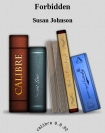Forbidden by Susan Johnson (best feel good books txt) 📗

- Author: Susan Johnson
Book online «Forbidden by Susan Johnson (best feel good books txt) 📗». Author Susan Johnson
Let them look, she thought, aware of the raised lorgnettes, the scrutiny, the whispered comment. She hadn't destroyed a loving marriage; there hadn't been a marriage with any intimacy from the very beginning.
Aware of their prospective reception, the Duc had debated coming tonight. He knew Isabelle would be present. But he wasn't going to hide, he'd decided. He had no reason to. His concern had been primarily for Daisy. How perceptible would the rudeness be? How barefaced the curiosity? Would she mind the stares?
"I hope your enjoyment of Verdi makes up for this burning interest we seem to be attracting. The houselights should be down soon."
"You're speaking to the only female in my law-school class and needless to say, the only Absarokee. I'm immune to curiosity seekers. Do you want to leave, though? These are all your acquaintances." She touched his hand lightly. "I never meant to bring your life to this…" her gaze swept over the crowd whose interest was still centered on either Isabelle or them, "… ferocious extremity."
For a moment his own glance took in the jeweled and glittering assemblage, pausing briefly on Isabelle and her party across the way. "We can't leave everywhere, darling. I intend to live my life in my usual way. Although Verdi," he said with a grin, "is a concession to you. I don't think I've been to an opera in years."
He'd come tonight for her, knowing full well his wife would be here, and a thousand curious eyes. "No wonder Adelaide seemed surprised when I told her we'd be joining them." A rush of tenderness infused her spirit. "Thank you," she very simply said.
"You make me happy. It's my pleasure." He was beyond questioning the joy she'd brought into his life, grateful only for the sheer luck of it.
"Isabelle has de Goux," Valentin declared, leaning across his wife to speak to Etienne in a lowered tone. "Good God, look who else walked into her loge. It's Delamaye. Do you think she's making a point tonight?"
"Charles is making a point tonight. I mentioned Aïda was on my schedule this week. I don't suppose, Rochette is any longer impartial," the Duc sardonically drawled. "Or Leblois."
"And Grevy and Carolus believe in 'policy drawn from Scripture,'" Adelaide interjected. "What about Loubet?" The great majority of magistrates belonged to the aristocracy; the judges being discussed were in fact members of the same small circle of families who had administered France for centuries.
"Loubet is up for Deputy Justice this year," Valentin said.
"As are Bauberot and Descave. Could we leave this all to Bourges?" Etienne softly said. "I find the roster tedious. Charles has appointed so many conservative and militant adherents of papal infallibility, the Church is beginning to exercise a magistracy of influence once again. Bourges is being paid to find a magistrate who does not believe God is the master of the judiciary. Let him deal with it. In fact, he almost joined us tonight," the Duc added.
"Joined us?" Adelaide said, mild query in her voice.
"Daisy invited him, but he had other commitments. Actually," Etienne said with a smile, "I think he has the good taste to find Verdi wearisome too."
"Well, he must be invited sometime when you approve of the composer, Etienne," Adelaide facetiously replied, courteous to Daisy's wishes.
Daisy recognized some of the magistrates' names, the rest she didn't know, but the gist of the conversation was plain. Etienne was going to find it very difficult to arrange for a fair hearing. Isabelle was entrenched within a framework of conservative policy with her brother its guiding instrument. Would Etienne's wife win? Daisy wondered for the first time, Bourges's equivocations too recent in her memory. Would all the generations of monarchists come to Isabelle's aid in their illustrious descendents? Would they refuse to allow Etienne his freedom? She was struck suddenly by the magnitude of the faultlessly balanced alliances that gave rise to France's tradition of great families.
Even the lavish spectacle of Verdi's score and Mariette Bey's Egyptian scenery and costumes failed to dislodge her premonitions of doom. The choice of Aïda tonight was perhaps unfortunate, for the opera, however beautiful, depicted the forces of impending, onrushing tragedy, the heartbreaking fate of Radames and Aïda's love too eloquently close to reality.
"I dislike self-sacrificing heroics," the Duc said as the curtain fell on the last sorrowful scene. "It's not real, darling," he added, his voice hushed when he saw the tears in Daisy's eyes. "It's melodrama. Mon chou ..." He took her hands in his and touched them to his lips. "Don't cry."
"Fate thwarted Aïda and Radames from the beginning," she said, her expression melancholy, her Absarokee background making her sensitive to the talismanic nature of the world.
"You control your own fate," Etienne replied, his voice calm, soothing. Clearly Daisy was upset. The story of Aïda, together with the ill-mannered crowd and Isabelle's phalanx of magisterial power, had been disturbing. "You command your own destiny," he added encouragingly.
"Within defined limits," Daisy quietly replied. She'd seen her tribal lands diminished piece by piece; she'd seen the buffalo decimated and her clan's nomadic plains existence destroyed. There were occasionally boundaries imposed on one's life; boundaries one must surmount, circumvent—or accept. And the choices weren't always benign.
"I don't believe in limits."
"You've been indulged, Etienne." She attempted a smile, conscious of both his kindness in disagreeing with her and his own inherent arrogance motivating his blunt declaration. "But I truly hope you're right."
Turning to Valentin, the Duc said, "Tell her how magistrates can be bought and sold, will you? And how loyalty





Comments (0)